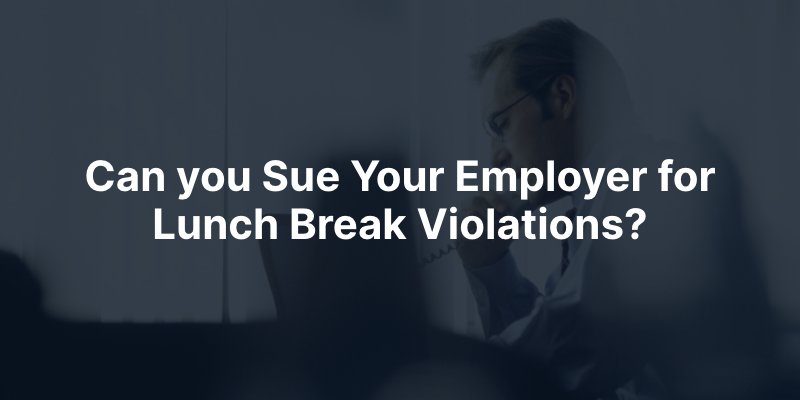California law mandates that employees be provided with meal breaks depending on the duration of their shift. Failure to adhere to these regulations can result in your right to sue.

Under California labor laws, non-exempt employees are entitled to a 30-minute uninterrupted meal break if they work more than five hours in a day. For shifts exceeding ten hours, employees are entitled to a second 30-minute meal break. However, employees may waive their meal breaks under certain conditions if the shift is less than six hours. Employers are obligated to ensure that employees are relieved of all duties during their meal breaks, allowing them to take their breaks freely.
California Rest Break Law
California’s rest break law requires employers to provide non-exempt employees with a paid rest break if they work more than three and a half hours in a day. The rest break must be at least ten minutes long and should be provided for every four hours worked, or major fraction thereof. During the rest break, employees must be relieved of all work duties and are free to leave the work premises if desired. Employers are obligated to ensure that rest breaks are taken in the middle of each work period whenever practicable.
When employers fail to provide employees with their mandated meal breaks or require them to work through their breaks, they are in violation of California labor laws. In such cases, employees may pursue legal action against their employers to seek compensation for the missed meal breaks.
The penalty for a missed meal break or rest break is one additional hour of pay at the employee’s regular rate for each workday that the break is not provided. This means that if an employee misses both their meal break and rest break on a single workday, they may be entitled to receive two additional hours of pay at their regular rate as compensation. Employers may also face additional penalties, such as premium pay, interest, and those imposed by the Labor Commissioner.
If your employer is violating your right to lunch breaks in California, you have several options to address the situation:
It’s important to take swift action if you believe your lunch break rights are being violated.
Q: Can my employer require me to work through my meal break?
A: No, employers are prohibited from requiring employees to work through their meal breaks. Employees must be relieved of all work duties during their meal breaks and have the opportunity to take their breaks freely.
Q: Can I leave the premises on my lunch break?
A: During meal breaks, employees must be relieved of all job duties, allowing them the freedom to leave the work premises for a 30-minute meal break. Consequently, employers are not obliged to compensate employees for this break duration as long as all work duties are suspended.
Q: Can an employer tell you when to take your meal and rest breaks?
A: While not required, employers have the authority to dictate when employees take their meal and rest breaks. Failure to comply with employer instructions may lead to disciplinary action or termination for insubordination, as permitted by California labor law.
Q: Can I sue my employer for lunch break violations while still employed?
A: There is no legal stipulation that necessitates an employee’s termination before filing a lawsuit against their employer.
Q: How early can I take my lunch break in California?
A: California mandates that the first 30-minute meal break must commence no later than the end of the employee’s fifth hour of work.
Q: Can I work 6 hours without a lunch break in California?
A: While California requires employees to have at least a 30-minute meal break if working over 5 hours, they can mutually agree with their employer to waive this break, provided the total work hours in the day do not exceed 6.
Q: Is my employer required to give me a rest break?
A: California law mandates employers to also grant rest breaks during work periods. Unlike meal breaks, which are unpaid, a ten-minute rest break is compensated. Employees who encounter issues with breaks can seek assistance from an Orange County Wage & Hour Attorney.
Q: Can an employer make you take a longer lunch to avoid overtime?
A: Employers may legally request employees to adjust their schedules to avoid overtime, such as leaving early or taking an extended meal or rest break, provided the total weekly hours worked do not surpass 40.